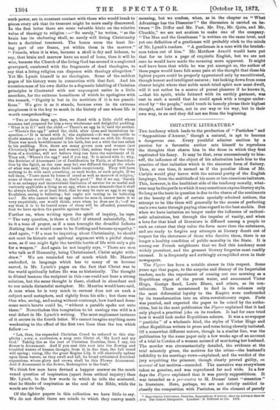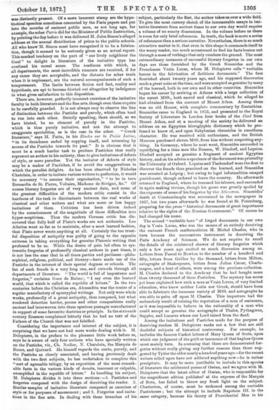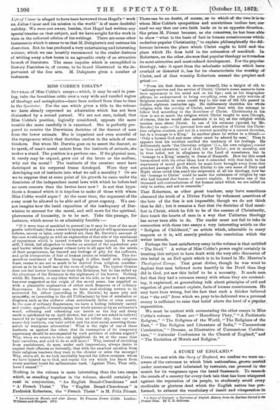IMITATIVE LITERATURE.*
THE tendency which leads to the production of " Pastiches " and "Suppositions d'Auteur," though a natural, is apt to become a dangerous one. Every youthful admirer smitten by a passion for a favourite author sets himself to reproduce the thoughts that charm him in the dress in which they first captivated his fancy. It may be that, even unconsciously to him- self, the influence of the object of his admiration leads him to the practice of that imitation which is the sincerest form of flattery. Thus, at one time, it seemed as if the peculiar idiom of Mr. Carlyle would play havoc with the natural purity of the English language, from the multitude of his more or less conscious imitators. This, however, is the healthiest side of the tendency morally, what- ever may be the perils to which it may sometimes expose literary style. So long as the taste in question is due to the charm of the sentiments or the beauty of style of certain specialty-admired authors, the attempt to be like them will generally be the means of perfecting one's own taste through paying close regard to the best models. But when we have imitation no longer under the influence of enthusi- astic admiration, but through the impulse of vanity, and when a love for that kind of literature is diffused among a people to such an extent that they value the form more than the substance, and are ready to forgive any attempts at literary deceit out of respect for the cleverness of those who deceive them, there is no longer a healthy condition of public morality in the State. It is among our French neighbours that we find this tendency most widely prevalent, and the grossest literary forgeries most readily excused. It is frequently and strikingly exemplified even in their newspapers.
The Figaro has been a notable sinner in this respect. Some years ago that paper, to the surprise and dismay of its Imperialist readers, made the experiment of coming out one morning as a Republican organ of the purest water, and announced Victor Hugo, George Sand, Louis Blanc, and others, as its con- tributors. Those accustomed to find in its columns only the most deferential loyalty to the Empire were confounded by its transformation into an ultra-revolutionary organ. Paris was puzzled, and expected the paper to be seized by the autho- rities, but in the next publication the Figaro explained that it had only played a practical joke on its readers. It had for once tried how it would look under Republican colours. It was a newspaper " pastiche " of a wholesale kind, the styles of Victor Hugo and other Republican writers in prose and verse being cleverly imitated. Of a somewhat different nature, though in a similar line, was the publication by the same paper only a few weeks ago of an account of a trial in Corsica of a woman accused of murdering her husband. The murder was circumstantially detailed, the evidence at the trial minutely given, the motives for the crime—the husband's infidelity to his marriage vows—explained, and the verdict of the jury acquitting the prisoner, though, clearly proved guilty, on account of her motives—recorded. The narrative was everywhere taken as genuine, and was reproduced far and wide. In a few days the Figaro explained that it was purely supposititious. It was intended as a per-contra to M. Dumas' latest " sensation " in literature. Here, perhaps, we are not strictly entitled to classify the composition with Pastiches, as the element of parody * Supercheries Litteraires, Pasticha, Suppositions d'Aedear, dant Les Let fro et darts la Arts. Par Octave Delepierre. Loadres : N. Trabaer et Cie. 1572.
was distinctly present. Of a more innocent stamp are the hypo-
thetical speeches sometimes concocted by the Paris papers and put into the months of eminent public men, as not long ago, for example, the sober Patric did for the Minister of Public Instruction, by printing the day before it was delivered M. Jules Simon's alleged address at the annual distribution of prizes to the public schools. All who know*M. Simon must have recognised it to be a fabrica- tion, though it seemed to be seriously given as an actual report.
This marked tendency on the part of "our lively neighbour the Gaul" to delight in literature of the imitative type has confused his moral sense. The readiness with which, in all departments, the most incredible rumours are received, if for any cause they are acceptable, and the distaste for sober truth when it is unpleasant, are the natural accompaniments of such a temperament. The limits between fiction and fact, reality and hypothesis, are apt to become blotted out altogether by indulgence in what gives satisfaction to this disposition.
There are, however, perfectly innocent exercises of the imitative faculty in both literature and the fine arts, though even these require to be carefully guarded. It is not always easy to observe the line of distinction between the Pastiche and parody, which often tend to run into each other. Strictly speaking, there should, as we have hinted, be no element of parody in the Pastiche, which is thus purely imitative, and not the attempt to
exaggerate specialities, as is the case in the other. "Greek literature," says M. Patin, in his Etudes sun is Poisie Louise, "in its decadence ended by copying itself, and returning by means of the Pastiche towards its past." It is obvious that it must be a much harder task to produce Pastiches that really represent an author in his entirety, than to give imitations of defects of style, or mere parodies. Yet the imitator of defects of style may be a maker of Pastiches, if he avoid the exaggerations in which the parodist delights. As has been observed by Nicholas Chatelain, in order to imitate various writers to perfection, it would be necessary "to assume their organisation," "to be in turn Bernardin de St. Pierre, Voltaire, Madame de Sevign6, &c." Of course literary forgeries are of very ancient date, and some of the greatest difficulties of the modern critic consist in the hardness of the task to discriminate between the real works of classical and other writers and what are more or less happy imitations of them. Criticism has been driven indeed by the consciousness of the magnitude of these difficulties into hyper-scepticism. Thus the modern German critic has dis- covered that fully half of Plato's works are not authentic. Leo Allatiue went so far as to maintain, after a most learned fashion, that Plato never wrote anything at all. Certainly the too trust- ful disposition of antiquity was guilty of going to the opposite extreme in taking everything for genuine Platonic writing that professed to be so. While the desire of gain led often to sys- tematic forgeries of professedly classical authors in past times, it is not less the case that in all times parties and partisans—philo- sophical, religious, political, and literary—have made use of the Pastiche in the interest of their special dogmas or schools. The list of such frauds is a very long one, and extends through all departments of literature. "The world is full of impostures and forgeries," exclaims Guez de Balzac ; "I say even the learned world, that which is called the republic of letters." In the two centuries before the Christian era, Alexandria was the centre of a regular manufactory of apocryphal writings. Not only were whole works, professedly of a great antiquity, thus composed, but what rendered detection harder, poems and other compositions really ancient had interwoven into them spurious passages manufactured in support of some favourite doctrine or principle. In the sixteenth century Erasmus complained bitterly that he bad no text of the Fathers of the Church that was not falsified.
Considering the importance and interest of the subject, it is surprising that we have not had more works dealing with it. M. Delepierre, in the preface to the pleasant little work before us, says he is aware of only four authors who have specially written on the Pastiche, viz., Ch. .Nodier, N. Chatelain, the Marquis de Roam, and Querard. He himself regards the canto, parody, and the Pastiche as closely associated, and having previously dealt with the two first subjects, he has undertaken to complete this "sort of agreeable trilogy, by an exposition of the most remark- able facts in the various kinds of deceits, innocent or culpable, exemplified in the republic of letters." In handling his subject, M. Delepierre divides it into three sections :-1. Pastiches and forgeries composed with the design of deceiving the reader. 2. Similar samples of imitative literature composed as exercises of style or for purposes of amusement ; and 3. Forgeries and imita- tons in the fine arts. In dealing with these branches of his subject, particularly the first, the author takes us over a wide field. To give the moat cursory sketch of the innumerable essays in imi- tative literature from ancient times to our own day would require a volume of no scanty dimensions. In the volume before us there is room for only brief references. In truth, the book is more a aeries of references than a serious narrative. Nevertheless, there is so much attractive matter in it, that even in this shape it commends itself to the weary reader, too much accustomed to find his facts beaten out through a mass of verbiage that only cumbers the ground. The most extraordinary instances of successful literary forgeries in our own days are those furnished by the Greek Simonides and the Frenchman Vrain Lucas, whom M. Delepierre calls "veritable heroes in the fabrication of fictitious documents." The first flourished about twenty years ago, and his supposed discoveries made a great noise at the time, and were accepted as genuine by many of the learned, both in our own and in other countries. Simonides
began his career by arriving at Athens with a large collection of the rarest MSS., both sacred and classical, which he alleged he had obtained from the convent of Mount Athos. Among them was an old Homer, with complete commentary by Eustathius. Simonides came to England in 1853, and presented to the Royal Society of Literature in London four books of the Iliad from Mount Athos, and at a meeting of the society he delivered an address on an Egyptian hieroglyphic dictionary which he pro- fessed to know of, and upon Babylonian chronicles in cuneiform character. He was received with enthusiasm, and the British Museum purchased eleven MSS. from him without suspecting any- thing. In Germany, where he next went, Simonides succeeded in mystifying for a time men like Bunsen, W. Diudorf, and Lepsius. Dindorf accepted as genuine a fragment of ancient Egyptian history, and on his advice a specimen of the document was printed by the University of Oxford. Lepsius and Tischendorf were the first to discover the frauds thus practised on the learned, and Simonides was arrested at Leipzig ; but owing to legal informalities escaped punishment, though ordered to leave the country. He afterwards returned to England, where he resumed his labours, and succeeded in again making victims, though his game was greatly spoiled by the exposure of some of his forgeries by the Athe ?mum. Sitnonidea' death at Constantinople was announced in the newspapers in 1867, but two years afterwards he was found at St. Petersburg, preparing for the press "historical documents of great importance relative to the rights of the Russian Government." Of course he had changed his name.
The second "veritable hero" of forged documents in our own day is Vrain Lucas, who was the means of so entirely deceiving the eminent French mathematician M. Michel Chasles, who in turn became the unconscious instrument in deceiving the Paris Academy of Sciences. We do not require to recall the details of the celebrated shower of literary forgeries which only a few years ago excited so much discussion among us. Letters from Pascal to Newton to the number of a hundred and fifty, letters from Galileo by the thousand, letters from Milton, autographs of Shakespeare, letters from Julius Cassar, Charle- magne, and a host of others, were among the precious collection. M. Chasles declared to the Academy that he had bought more than twenty thousand of these Pastiches. The mystery has never yet been explained how such a man as Vrain Lucas, of very limited education, who knew neither Latin nor Greek, should have been able to fabricate the immense variety of MSS. and autographs he was able to palm off upon M. Chasles. This imposture had the melancholy result of raining the reputation of a man of eminence, as it was impossible to believe in the rationality of a man who could accept as genuine the autographs of Thales, Pythagoras, Sappho, and Lazarus whom our Lord raised from the dead.
Among the imitations and Pastiches made for the purpose of deceiving readers M. Delepierre ranks not a few that are still doubtful subjects of historical controversy. For example, he includes the famous Casket letters of Mary Queen of Scots, upon which our judgment of the guilt or innocence of that hapless Queen must mainly turn. In assuming that these are demonstrated for- geries without really giving any further reasons than those sug- gested by Tytler the elder nearly a hundred years ago—for the recent writers relied upon have not adduced anything new—he is rather precipitate. It may be more justifiable to include in this species of literature the celebrated poems of Ossian, and we agree with M. Delepierre that the latest editor of Ossian, who is responsible for the magnificent edition published at the expense of the Marquis of Bute, has failed to throw any fresh light on the subject. Chatterton, of course, must be reckoned among the veritable Pasticheurs ; but the attempt to include Napoleon III. in the same category, because his theory of Providential Men in his Life of C'tesar is alleged to have been borrowed from Hegas "work on Julius easier and his mission in the world" is of more doubtful validity. We were not aware, besides, that Hegel had written,any special treatise on that subject, and we have sought forth° work in vain in the collected edition of his writings. There are some other instances in which it seems to us that M. Delepierre's zeal outruns his discretion. But he has produced a very entertaining and interesting volume, which we can heaatily recommend to the reader desirous, of whilingsway a few hours in an agreeable study of an attractive branch of literature. The same impulse which is exemplified in literary Pastiches is, of course, to be found illustrated in the de- partment of' the fine arts. M. Delepierre gives a number of instances.




































 Previous page
Previous page